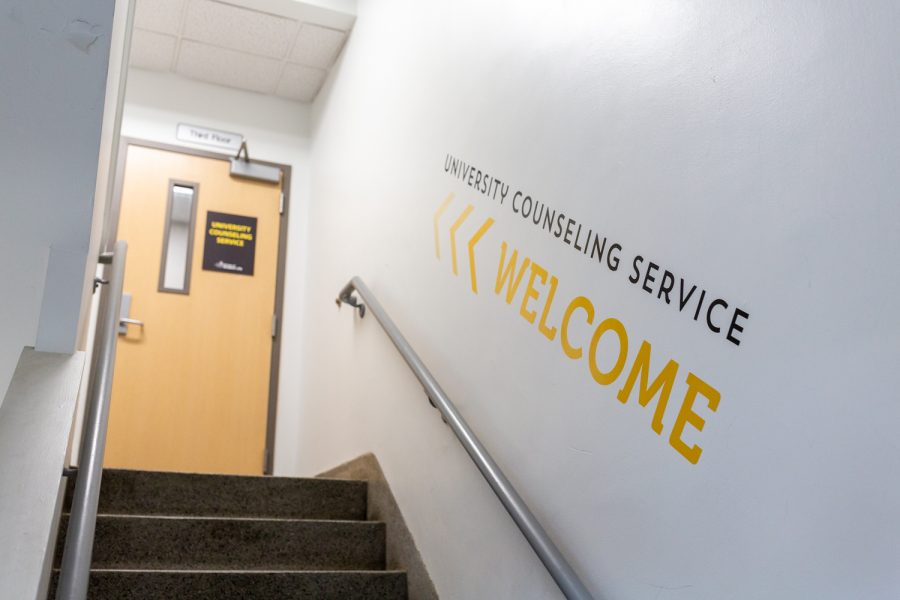Opinion: University Counseling Services should offer more long-term resources
Psychiatric aid has a responsibility to be consistent, not temporary.
Westlawn Hall at the University of Iowa is seen on Wednesday, Oct. 3, 2018. Westlawn is the location of University Counseling Services.
December 10, 2019
Students deserve to focus on their mental health. Access to these resources, however, is expensive. Professional therapy, pharmaceutical prescriptions, medical care: this all costs thousands of dollars within a health-care system that does not work for the middle-class economy. Even so, campuses like the University of Iowa have worked to provide mental-health aid to its students.
But these resources have clear expiration dates. The limitations on what the UI can provide has agitated many within the student community who need treatment.
In order to be a true resource for mental health, the UI needs to redesign its student-health program. Long-term aid should exist for long-term struggles, such as suicidal thoughts.
The UI’s student health has an entire department dedicated to psychiatry through University Counseling Services, but it’s only available through a paid health fee.
If you have, you have the resource of making an appointment for individual, group, or couples counseling. Whichever you choose, you will be given a limited amount of sessions.
Bryana Dawson is a first-year graduate student in the UI’s clinical mental-health program through the College of Education. I spoke with her to discuss limits to mental-health access on campus.
“Those limits are in place because these services are designed for more low-level cases,” Dawson said. “If a student has more serious needs or wishes to continue therapy, they will be given a referral.”
Most students who seek counseling do not necessarily have a low-level issue to process. Many are dealing with clinical depression, grief, abuse, or suicidal thoughts.
A referral is UCS’s process of recommending a student patient to another mental-health professional.
“Say you’re going through individual counseling. Once you’ve had eight sessions, if your counselor assesses that you need more counseling, you’d be given the option of a referral,” Dawson said.
In most cases, eight sessions is simply not enough. Most students who seek counseling do not necessarily have a low-level issue to process. Many are dealing with clinical depression, grief, abuse, or suicidal thoughts. These require long-term psychiatric aid, consistent throughout a semester, academic year, or longer.
Also, depending on a student’s insurance plan, going to a referred mental-health professional may become another overwhelming bill to pay. Students already have tuition debt, rent, and daily living expenses. Paying to transition to a different therapist may not appear to be worth it.
Transferring from one therapist to another is also emotionally taxing.
“It can definitely be a draining process for a student,” Dawson said.
Beyond UCS, there have been attempts to examine high-level cases of mental illnesses, such as suicidal thoughts or tendencies, through a program, Kognito. The program is a recent addition to the UI’s mental-health resources, focusing on suicide prevention.
Kognito trains instructors and students in how to approach and support those dealing with mental illness. While this is a very positive step toward creating more long-term aid, the UI must provide more for UCS to be successful. Dawson agrees that this would be ideal.
“I do think the nature of something being short term can be discouraging,” she said.
Student depression, anxiety, and other mental illnesses should not be primarily seen as a data point to be studied. The statistics and information collected by programs like Kognito and services like UCS should emphasize the need for long-lasting, individual resources for students.
Students seeking therapy need consistency, validation, and empathy. All of this should be built and secured through needed time, not limited time.
For the UI’s mental-health resources to become stronger, programs must be redesigned as long-term resources. UCS would become more trusted by students if their programs did not focus on temporary aid.
Put simply, long-term mental-health aid would not only save students’ money, it would save students’ lives.















